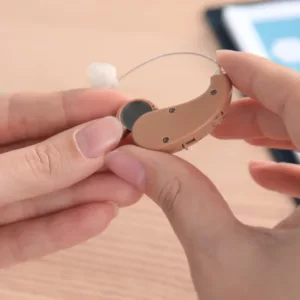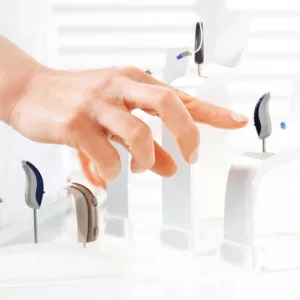Hearing Aid Repairs: What Works?
Hearing aids play a vital role in improving the quality of life for many. Occasionally, they may encounter problems. Luckily, some of these hearing aid repairs can happen right in the comfort of your own home. However, when the situation becomes more complex, the skilled professionals at your nearby hearing center are ready to help.
Don’t Panic! Fixing Common Hearing Aid Problems at Home (without voiding your warranty)
Facing issues with your hearing aids can be frustrating, but don’t worry; many common problems have straightforward solutions that won’t compromise your warranty. Let’s walk through some essential troubleshooting steps to fix hearing aids.
Start with the Basics
- Ensure Cleanliness: Regularly cleaning your hearing aids with a soft, dry cloth helps maintain clear sound. Avoid water and harsh cleaners.
- Check the Battery: Dead batteries are a common issue. Replace them with new ones, ensuring they’re the right type and inserted correctly.
- Adjust Volume: Make sure the volume is not turned down or muted. Some devices have a lock feature, so check for that, too.
- Manage Moisture: If your hearing aids get wet, open the battery compartment and let them air out. Avoid using heat to dry them.
Additional Tips
- Use Wax Removal Tools Wisely: Manufacturers may provide tools for safe wax removal. Use them as directed to avoid damage.
- Perform a Sound Check: Gently clean microphone and receiver openings with a brush or toothpick to remove debris. Be careful not to damage these parts.
Troubleshooting Specific Issues
- Dead Hearing Aid: Verify the device is on, and the battery is correctly placed. Replace the battery if it’s dead. Check the volume settings and clear any blockages. If damaged, seek professional help.
- Not Loud Enough: Examine the volume control, the tubing for damage or blockages, and try different settings. A hearing evaluation might be necessary for new hearing requirements.
- Distorted or Unclear Sound: Check the battery for corrosion and inspect the contacts. Clean or replace as needed. If the device is damaged, professional maintenance is advised.
- Whistling or Feedback: Ensure the hearing aids are properly inserted. Feedback might indicate a fit issue or earwax buildup. Lowering the volume can help, but a professional fit adjustment or ear cleaning might be required.
Remember, these steps can help with many common hearing aid issues, but they’re not one-size-fits-all solutions. Always refer to your user manual for specific guidance. If in doubt or if the problem persists, it’s best to reach out to a hearing center with repair services. Our team is here to help with comprehensive care, from simple fixes to more complex hearing aid repairs.

Is It Time for a Professional Hearing Aid Repair Service?
Sometimes, despite your best efforts, your hearing aids might still act up. That’s when you know it’s time to call in the pros. Professional hearing aid repair services offer more than just a quick fix; they bring a level of expertise and precision that DIY attempts can’t match. Here’s how to tell when you need to hand over your device to the experts.
Understanding the Limits of Home Repairs
Home remedies can solve minor problems, but they have their limits. When you’ve tried everything from changing batteries to cleaning the device and still face issues, it’s a clear signal to seek professional help. Experts use specialized tools and techniques to fix hearing aids, ensuring the repairs don’t void your warranty.
Key Signs You Need Professionals to Fix Hearing Aids
- Persistent Sound Issues: If your device emits distorted sounds, fluctuates in volume, or gives off constant feedback, it’s a job for the specialists. These issues often hint at deeper internal problems.
- Rapid Battery Drain: Batteries that die quickly might indicate more serious issues, like a malfunctioning battery compartment. Professionals can pinpoint and solve these problems efficiently.
- Sudden or Unexplained Power Loss: When your hearing aids won’t turn on or suddenly shut off, it’s time for a professional diagnosis.
- Visible Damage: Cracks, breaks, or any physical damage to your hearing aids are clear indicators that you need professional repair services.
- Moisture Damage: Water and electronics don’t mix. If your hearing aids get wet, professional repair can help avoid long-term damage.
- Fitting Issues: Over time, your ears might change shape slightly, affecting how your hearing aids fit. Professionals can adjust or replace earmolds to ensure a perfect fit.
The Professional Advantage
Choosing hearing aid repairs means getting your device back in working order without risking further damage. Experts offer comprehensive diagnostics, precise repairs, and advice on maintaining your hearing aids. Plus, they can help with warranties and adjustments and even advise on when it might be time to consider upgrading to a new model.
How Do Hearing Aid Repairs Work at American Hearing + Audiology?
At American Hearing + Audiology, we streamline hearing aid repairs to ensure your devices function like new again. Here’s a peek into our repair process.
Understanding the Repair Process
- Initial Assessment: Our technicians start by noting your reported issues, laying the groundwork for a thorough examination.
- Listening Checks: We conduct listening tests to identify any clear sound quality issues.
- Visual Examination: A detailed microscope inspection reveals any corrosion, moisture damage, or physical wear.
- Advanced Diagnostic Tests: Using cutting-edge analyzers and software, we evaluate your hearing aid’s performance against manufacturer specs. This includes checking sound response, maximum output, and feature functionality.
- Wireless and Telecoil Testing: We ensure all connectivity features operate smoothly for uninterrupted use.
- Component Replacement: Faulty parts get replaced with repeated tests to guarantee peak performance.
Our Concierge Hearing Service Plan
To keep your hearing aids in top shape and minimize repair hassles, consider our Concierge Hearing Service Plan. It includes:
- Unlimited Clean & Checks: Regular visits for professional cleaning and performance checks.
- Programming Adjustments: We keep your device updated for optimal functionality.
- Real-Ear Verification: This guarantees your hearing aid’s output matches your unique hearing profile.
- Loaner Hearing Aids: Should your device need factory repairs, we’ve got you covered with a loaner.
- Comprehensive Support: From Bluetooth assistance to ear irrigation, our plan covers all bases for hearing health.
- Cost Savings: Enjoy significant discounts on repairs, extended warranties, and other services.
By choosing American Hearing + Audiology, you benefit from expert care, advanced repair techniques, and a service plan designed to keep your hearing aids in prime condition. Reach out to us to learn more about our services and how we can help fix hearing aids efficiently and effectively.

Hearing Aid Repairs vs. New Hearing Aids: Making the Right Choice for Your Hearing Health
Navigating the choice between hearing aid repairs and opting for new hearing aids is a pivotal step for your hearing health. This decision hinges on a mix of considerations, including the age and state of your current aids, advancements in hearing technology, and the overall cost impact.
Age and State of Your Hearing Aids:
- Age Matters: If your hearing aids are nearing or have surpassed the 5-7 year mark, investing in new ones might be more beneficial. The older the device, the more likely it is to need frequent fixes.
- Assess Condition: Have your aids been repaired often? If they’re showing signs of extensive wear, new hearing aids could be the way to go.
Technological Advancements:
Modern hearing aids come packed with features such as Bluetooth connectivity and noise cancellation. These upgrades can significantly enhance your hearing experience. If your current aids lack these, consider making the switch.
Severity of Hearing Loss:
- Progressive Loss: For those with hearing that’s deteriorating, newer aids designed for advanced amplification might serve you better.
- Severe Loss: High-powered modern aids offer better support for severe hearing issues, providing the amplification you need.
Cost Considerations:
- Weighing Costs: Compare the expense of repairs against the price of new aids. Sometimes, the cumulative cost of repairs can outstrip the investment in new technology.
- Warranty Wisdom: If your warranty has expired, new aids might offer a more cost-effective solution with fresh warranty coverage.
Remember, while repairs can extend the life of your hearing aids, there comes a time when new hearing aids are not just a choice but a necessity for optimal hearing health. Whether it’s due to advancements in technology, changes in your hearing condition, or simply the age and condition of your current aids, carefully weigh your options. Your decision should align with your needs, ensuring you enjoy the highest quality of life possible.
Find out more about hearing aids Kansas City.

We Can Fix Hearing Aids and Check Your Hearing Too!
In wrapping up our journey through the world of hearing aid repairs and when to consider new hearing aids, we hope you feel more informed. Deciding between fixing hearing aids and opting for new ones hinges on several personal and technical factors. Whatever path you choose, ensuring your hearing aids work best for you is key. Remember, American Hearing + Audiology is here to assist with all your hearing aid repair needs. If you’re pondering repairs or simply seeking advice, don’t hesitate to call us. Let’s ensure your hearing aids support your lifestyle perfectly. Contact American Hearing + Audiology today for expert guidance and support.



